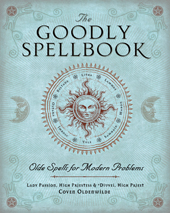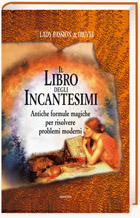To Conjure Abundance
Simply acquiring more money rarely alleviates the chronic lack thereof. Rather, ongoing, oppressive material needs are best met by your conjuring a pervasive providence that helps you flourish in multitudinous ways.
To prevent poverty, make an arrangement of dried alfalfa and keep it in your home.
Another way to prevent penury is to carry an abundance charm, such as a shamrock. Each clover leaf bestows a gift to promote a happy life–the upper left leaf wafts you wealth, the upper right leaf elicits you love, the bottom right leaf grants you health, and the bottom left leaf favors you with fame.
Faced with insufficient funds to replace our Covenstead’s roof, we recently employed an olde Strega spell for abundance. The spell called for us to stick a lemon, which represents the Moon, with color-tipped straight pins (except black) and suspend it with hemp or thread in some out-of-the-way corner. We circled with our covenmates and took turns inserting the pins as deeply as the rind would allow, initially covering the lemon’s surface with pinheads of various colors. We then used only green-tipped pins to demarcate a runic F to signify the Feoh sign that represents material goods. (You could substitute a bounty-bringing square, Earth’s ancient magical symbol.) We duly received an unexpected donation that enabled us to replace our leaky old roof with a goodly new one.
A different abundance rite begins with a sweeping spell attributed to a wealthy Irish Witch of the 1300s named Dame Alice Kyteler.
Shortly before midnight on a Thursday during a waxing or full Moon, privately gather your spell ingredients. Taking your besom in hand, sweep sunwise toward the center of your circling area, muttering your own personal adaptation of Dame Alice Kyteler’s incantation. In the first line, substitute the name of the person for whom you’re conjuring wealth. In the second line, say their appropriate designation, such as "my (self)", "my (mate)", or "my (daughter)", and so forth. On the charm’s fourth and final line, supply the name of the town you live in or nearest to.
"To the house of (William),
my (son)–
Hie all the wealth
Of (Kilkenny) town!"
Improve your ritual area’s decor and ambiance to augment your ability to attract abundance–light Earthy, emerald-colored candles and so on. Cast a circle sunwise to initiate the increase magic. Sit and recall times when miraculous luck and Divine favor graced you. Picture yourself provided with plentitude.
Whenever you’re ready, make lucky "fixed rice". Fill a glass bowl with approximately three cups of raw rice. Drip green food coloring on top of the grains with your right hand, and then stir sunwise with a chopstick or silver spoon to evenly dye the ingredient. Stare deeply into the rice, and fervently invoke Copia, Gaea, and Jupiter to empower the green grains to draw prosperity to you and yours from every direction and dimension.
When your fixed rice has dried and you feel duly inspired, fling handfuls of the grains high into the air! The more you toss, the more you’ll be inundated with serendipitous showers of the God/desses’ largesse. Sweep the rice up with your besom, and store it for future use in an airtight container.
Henceforth, whenever you need funds, use an appropriate amount of the lucky fixed rice in a spell to relieve your need. (Minor monetary matters require minimal rice, whereas the brink of bankruptcy requires a copious quantity.)
Coven Oldenwilde’s Maiden first used her lucky rice to obtain cheap tickets to see holy sites in Mexico. The components worked so well, Cassandra-Shine used them again to draw food during a prolonged period of unemployment. That worked so successfully that she used her lucky fixed rice a third time, and landed her dream job.
- To attract money on an ongoing basis, carry a few grains of green prosperity rice in your wallet, coin purse, or checkbook.
- Leave an offering of fixed rice for Gaea or Hertha at the base of a plant or tree.
- Put a goodly amount of lucky green rice on a tray, or spill a goodly quantity on the floor. With your forefinger, draw designs that symbolize your need.
- After you empower the rice to attract your desire, fill a mojo bag or necklace pouch with it, and wear the bag until your wish is fulfilled. Charge your amulet once a month during the full Moon to keep abundance flowing your way.
- Don’t fling your luck away–whenever you sweep or rake anything, stroke inward toward the center of your house or property.
Spell Origin: Voudon, Strega Italian, Irish, and Santeria magic
Spell Timing: midnight on a Thursday during a waxing or full Moon
Ingredients: dried alfalfa; a lemon, color-tipped (but not black) straight pins, hempen string or thread; a besom, green candle(s), 3 cups of raw rice, a glass bowl, green food coloring, a chopstick or silver mixing spoon, and an airtight container
Ambiance: alone, indoors, in a private magical space
Magical Theory:
Sympathetic magic: Although a lime might seem to symbolize more aptly the emerald Earth, "The Conjuration of the Lemon and Pins" in Aradia: Gospel of the Witches equates a lemon with the Moon, and an orange with the Sun.
La Luna is a luck-bringer Who can take away your poverty during the low tide She creates, or inundate you with plenty during Her full phase.
Lush Earth offers everyone infinite options for opulence. Dyeing green a crop that much of the world depends on for sustenance directly attracts Gaea’s bounty to your daily life.
The Goddess Copia (of cornucopia fame) has the power to bestow "copious" abundance.
Because plants grow in all directions, luck will similarly come to you from everywhere if you leave an offering to an Earth Goddess at the base of a plant or tree.
Thursday is Jupiter’s day. The largest planet in our solar system, Jupiter is the astrological ruler of abundance and good fortune. In chiromancy (palmistry), Jupiter rules the forefinger.
Sweeping or raking outward disperses your prosperity to others. Dirt, grass clippings, and leaves are organic, so by sweeping toward your property, you not only maintain your household’s prosperity, but replenish your land’s fertility as well.
Deities to Invoke: Copia, a Roman Goddess of bounty; Gaea and Hertha, Greek Earth Goddesses; Jupiter, a Roman God of expansive abundance
To Reveal the Identity of a Thief
Find out who stole from you–take up the black fast:
"Who has been robbed and wishes to find the thief should take a black hen, and for nine Fridays must with the hen fast strictly; the thief will then either bring back the plunder or die."(1)
But there’s an easier and no less traditional way to unmask a mischief- maker. Should you have several suspects, consider each in turn, then carve each person’s initials in a separate apple with a boleen. The fruit that withers the fastest bodes the bandit.
If you have no inkling of a thief’s identity, cast a sunwise circle and ask for avenging justice from the Goddess Nemesis, Who will duly mark them with some temporary, but obvious, sign of guilt.
A second "mark-the-thief" spell from the Key of Solomon(2) was used by a student of ours whose boss had requested she use magic to determine which employee had absconded with the business’s grand-opening earnings.
First, suspend a sieve by a piece of hemp (originally, "a cord wherewith a man has been hung") fastened around the circumference of its rim. At each Quarter on the inside of the sieve’s rim write with Dragon’s Blood ink these characters:
Then fill a clean brass basin with water from a fountain and pronounce these words:
"Dies Mies Yes-chet
Bene Done Fet
Donnima Metemauz"
Spin the sieve with your left hand. Simultaneously, stir the basin water in a contrary direction with a twig of green laurel in your right hand. When the water becomes still and the sieve no longer whirls, gaze fixedly into the water, and you will see the form of whoever has committed the theft. Cut a sign into the water with your athamé. The next time you see the thief, they will be sporting the mark in the form of a sore, a scratch–even an infected boil–on their face.
The day after our student performed this spell, she identified the robber with ease when he came to work afflicted with a telltale facial sore. Her boss phoned the cops, who subsequently questioned the man. He readily confessed and promptly returned all the money.
- To increase your psychism and help you deduce a robber’s
identity, burn a handful of linseeds in a censer.
They will pop around and form the culprit’s initials.
Spell Origin: Transylvanian, European, ceremonial, and Voudon magic
Spell Timing: during moondark or moonbright; as needed
Ingredients: a black hen; as many apples as suspects and a boleen; a sieve, hempen string, dragon’s blood ink, a brass basin, fountain water, a twig of green laurel, and an athamé
For the variation: a handful of linseeds, a censer, charcoal, and matches
Ambiance: your private circling space, surrounded by candles and permeated with incense
Magical Theory:
Sympathetic magic: Because an apple represents an individual on a microcosmic level, you can use it as a magical poppet to represent each suspect.
As you mark the thief's image in the water, so you mark their actual face.
Laurel has been associated with prophecy since ancient times.
To expose a thief to the light of day, cast circle sunwise.
Inversion: Pulverized linseeds make oil as slippery as a thief. In this spell, the intact seeds are poppets of the robber, so burning them compels the thief to "confess" their identity by forming his or her initials.
Deity to Invoke: Nemesis, a Goddess who avenges injustice
(1) [Charles Godfrey Leland,]
Gypsy Sorcery and Fortune Telling, pg. 137. (Back)
(2) From Macgregor Mathers's
edition of the Key of Solomon, Chapter 9, pg. 48-50 (1203
Lansdowne manuscript). (Back)







